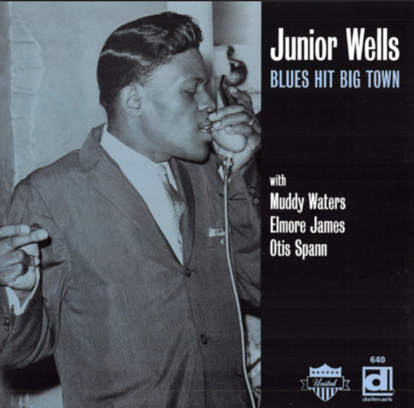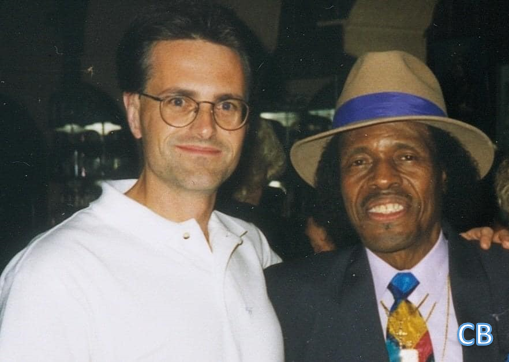Essential Blues Recording
Junior Wells – Wells’ Extraordinary Earliest Blues Harvest
Junior Wells – Blues Hit Big Town – Delmark DD-640
For my money, Wells’ harmonica on this collection is the best he ever presented. And that, to me, is saying a lot, as I am an unabashed fan, and his career’s recorded works are bursting with terrific expeditions on the humble instrument.
It’s challenging appraising blues recordings, and authoring pieces about the blues, since no matter how hard I endeavor, my prejudices are ultimately going to become apparent. I realized this back when I obtained my Masters Degree from Indiana University, researching and writing a graduate thesis on the notion of travel in blues lyrics. As a component of that capstone undertaking, I incorporated an appendix that embodied 50 essential blues collections that I felt belonged in every personal blues collection. When I now reflect back up on that roll, I can conspicuously see my intrinsic inclinations, but that is not singular to me. No less a revered music writer and critic than Peter Guralnick remarked in one of his superb books that he experiences the same challenge.
But with Junior Wells, I am beyond a bit jaded. From the first time I heard Wells’ music originating from my stereo speakers, witnessed him performing to eager audiences in venues small and large, made acquaintances with him, and studied his many blues recordings, I have determined him to be in the highest tier of the blues tradition.
Wells’ 1965 Hoodoo Man Blues, his pivotal recording on the Delmark label, captured a working Chicago blues group on a recording, being the first of its kind, with the outcome being greatly applauded, and appropriately so, as one of the most significant blues recordings ever.
This 2015 17-cut CD reissue of an original 1977 12-selection outing gloriously presents Wells’ introductory output for the Chicago-based States Record Company label, an imprint that was a subsidiary of United Records. States Record Company focused on blues, R&B, and jazz offerings, and Wells’ production for the label saw him on a blues roster that included Robert Nighthawk, T. J. Fowler, L.C. McKinley, James Banister, Harold Burrage, Big Walter Horton, and Lefty Bates.
Wells would have been 19 and 20 years of age at the time of these sides, certainly at the peak of his youth, strength, and emerging proficiencies. His singing is confident but not brash, and his harmonica flourishes completely dazzle with their inventiveness and array of sonic frameworks. Again, I cannot immediately bring to mind any collections where Wells’ harmonica incursions please as much as those found across this collection’s grand offerings.
Backing Wells on these blues are an astounding assemblage of Chicago blues royalty including Elmore James, Louis Myers, Muddy Waters, Johnnie Jones, Otis Spann, Dave Myers, Willie Dixon, Fred Below, and Odie Payne, Jr. Their individual and collective buy-ins on Wells’ spectacular blues visions mightily assisted in yielding blues of such an astonishing level.
Wells’ lofty reputation was launched via these fantastic blues, and whether the great work here is lively paced or of a slower cadence, a sung selection or an instrumental, this was the beginning of one vital and hearty slice of the esteemed Chicago blues saga.
I remember like it was just recently witnessing Wells hold court at Chicago’s famed southside blues joint, The Checkerboard Lounge at 423 E. 43rd St. in Chicago, dazzling, as always, in a spectacularly colorful and yet sophisticated suit wholly apt for the blues peacock ruling the venue’s diminutive stage. Each Wells show was an event, and I revere my recollections of each of them.
Essential without any qualification! Your blues collection needs this seminal Junior Wells work; without it, is has an obvious void.

